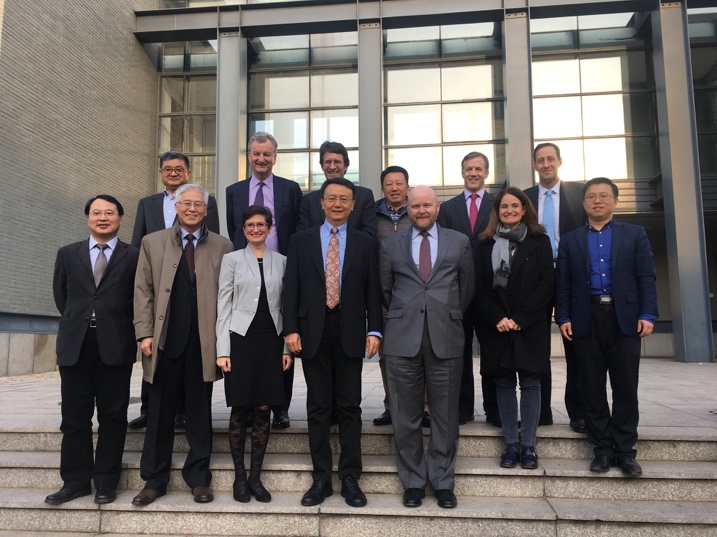From March 19 to March 20, 2018, 15 experts and scholars from famous think tanks and universities in China and the United States attended the seminar on Managing Global Disorder: Prospects for China-U.S. Cooperation held at the School of International Studies, Peking University The seminar was jointly sponsored by the Institute for China-U.S. People-to-People Exchange, Peking University (Base of the Ministry of Education), and the Council on Foreign Relations, a well-known American think tank.
The U.S. scholars attending the seminar came from top international think tanks and research institutions such as the Council on Foreign Relations, the Carnegie Endowment for International Peace, and the United States Studies Centre at the University of Sydney. Chinese scholars come from famous domestic think tanks and academic institutions such as Peking University, National Defense University, China Institutes of Contemporary International Relations and China Reform Forum.
At the beginning of the seminar, Professor Jia Qingguo, Dean of the School of International Studies, Peking University, and Executive Director of the Institute for China-US People-to-People Exchange, Peking University, delivered a welcome speech. He stressed that in the context of changes in the global order and outstanding international challenges, holding this seminar is of great significance for China and the United States to clarify the prospects for cooperation in the field of managing global disorder.
James M. Lindsay, Senior Vice President and Director of Researche at the Council on Foreign Relations, and Paul B. Stares, Senior Researcher and Director of the Center for Preventive Action (CPA) of the Council on Foreign Relations, introduced the contents of the visit to China and the research project. Wang Dong, Associate Professor of the School of International Studies, Peking University, and Executive Deputy Director of the Institute for China-U.S. People-to-People Exchange, Peking University, introduced the topics and key concepts discussed at this seminar.
This seminar covers crucial issues related to China-U.S. relations. During the two-day seminar, experts and scholars from China and the United States held frank and in-depth exchanges and discussions on six topics, namely, international order, global governance, the Belt and Road Initiative, international trade, security challenges, and regional issues, in an effort to build consensus, enhance mutual trust, and give full play to the bridging role of think-tank exchanges in China-U.S. relations.

Topic 1 Challenges of the International Order: A Comparative Assessmnt was moderated by James M. Lindsay, and keynote speeches were made by Jia Qingguo, Paul B. Stares and Wang Dong respectively.
Topic 2 The Future of Global Governance: Adapting International Norms and Institutions to New Challenges was moderated by Jia Qingguo. Stewart Patrick, Senior Researcher and Director of International Institutions and Global Governance Program of the Council on Foreign Relations, and Cui Liru, Senior Advisor and former Director of China Institute of Contemporary International Relations delivered keynote speeches respectively.
Topic 3 The Belt and Road Initiative of China: Challenges and Opportunities was moderated by Edward Alden, a senior researcher at the Council on Foreign Relations. Elizabeth Economy, Director of the Asian Studies Department and senior researcher at the Council on Foreign Relations, and Zha Daojiong, a professor at the School of International Studies, Peking University, delivered keynote speeches respectively.
Topic 4 Adjusting International Trade was moderated by Cui Liru, and Edward Alden and Wang Yong, Professor of the School of International Studies, Peking University, and Director of the Center for International Political Economy, Peking University, delivered keynote speeches respectively.
Topic 5 Managing East Asian Security Challenges was moderated by Paul B. Stares. Charles Edel, a senior researcher at the United States Studies Centre at the University of Sydney, and Major General Xu Hui, Dean of the International College of Defense Studies, NDU, delivered keynote speeches respectively.
Topic 6 Managing the Security Challenge in South-West Asia was moderated by Zha Daojiong. Cara Abercrombie, a visiting researcher of the South Asia Program of the Carnegie Endowment for International Peace and former Deputy Assistant Secretary of U.S. Department of Defense, Ma Jiali, Director of the Strategic Research Center of the China Reform Forum, and Qian Xuemei, Associate Professor of the School of International Studies, Peking University, respectively delivered keynote speeches.
At the end of the seminar, Jia Qingguo expressed the hope that the results of the exchanges between the two sides will make constructive contributions to the changing China-U.S. relations and policy formulation.
The Institute for China-U.S. People-to-People Exchange, Peking University is a new think tank for promoting China-U.S. people-to-people exchanges and the development of China-U.S. relations, serving the diplomacy of great powers with Chinese characteristics in the new era, and building a community of shared future for mankind. The seminar jointly organized by the Institute and the Council on Foreign Relations is a significant international academic conference, which has attracted great attention from the academic and policy circles of China and the United States. The purpose of the seminar is to gather the wisdom of experts and scholars from first-class think tanks and universities in the United States and China, and to establish a cooperative team of Chinese and American scholars to make new contributions to the development of people-to-people exchanges between China and the United States in the new era through in-depth discussions and exchanges.
